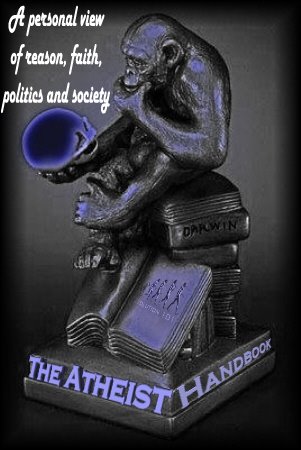 I am reluctant to use the word atheist to describe my own unshakable disbelief, and that's not because I'm ashamed, afraid, or even embarrassed, but simply because it seems so self-evidently true to me that there is no god, and giving that conviction a special title somehow dignifies what it denies. After all, we don't have a special word for people who don't believe in ghosts or witches.
I am reluctant to use the word atheist to describe my own unshakable disbelief, and that's not because I'm ashamed, afraid, or even embarrassed, but simply because it seems so self-evidently true to me that there is no god, and giving that conviction a special title somehow dignifies what it denies. After all, we don't have a special word for people who don't believe in ghosts or witches.-Jonathan Miller
It goes without saying, I think, that atheism - the intellectual position that one does not accept claims about the nature of life and universe without evidence - is in the midst of something of a revival. Just run the words "Atheist" or "Atheism" through Google news and you'll a host of articles and blogs. These days most are broadsides fired by believers disquieted by a growing number of people who dare not believe. But you'll also find commentary by the Four Horsemen - Richard Dawkins, Christopher Hitchens, Sam Harris and Daniel Dennett, the authors of the books which energized the surge in atheist conviction we see in public.
The most common feature of this so called "New Atheism" is a slashing critique of religion, rooted in a demand for evidence, and those of us inspired by the horsemen have followed their lead. Having dispensed with the supernatural claims of religions, particularly the assumed but unsupported by evidence claim of a god, this critique turns to the moral and ethics of religion - morals and ethics which, more often than not and particularly in the Jewish/Christian/Muslim mode, are found wanting in the extreme.
Believers often rail against this approach. We often ignore their complex and arcane theology, and they see this as a fundamental weakness. If we only understood the 21st century theological views of why god is a loving god, we, the growing legion of new atheists, would understand our arguments are weak. If only we spent more time discussing Aquinas and Augustine, we would see our demand for evidence isn't important.
Nonsense. All the theological gymnastics are fairly useless if evidence,( and by this I mean scientific evidence) the first question, the most important question, cannot be answered. As Cicero put it: the first question in this subject of the nature of the gods is do the gods exist or not? If we conclude, and we do on the basis of evidence, the gods do not exist, then need we worry about god as love, or god as father or god as source of morals? Surely not. What matters is what do those beliefs lead people to do, good or bad.
We need not go upon bended knee and only face the theological questions on the terms believers would have us use. If evidence matters, and we are told we must have regard theological "truths" and statements about the nature of reality, then we can hold those claims up to science, to reason and demand meaningful evidence. And where evidence is lacking, the claim can be (at least provisionally) put aside.
This is what the believer objects to the most. Ironically, they will often (as a scan through google blogs and news will attest) claim that new atheists use a "scientific dogma" and that atheism is a religion.
It is, to be sure, a curious claim. Atheism has no codes. No creeds. No commandments. No pastors, priests or popes. It has no holy texts. No churches, temples or sacred grounds. It has no punishments, real or imagined, for not being an atheist. So where exactly is the "religion" of atheism? I've asked many a believer this question and have yet to hear a reply. I wait still.
And this business about "scientific dogma"? It is an even more through the looking glass argument. What is dogmatic about asking for evidence about claims about the nature of reality? What is dogmatic about requiring evidence to make a conclusion? Surely, there are atheists who do not believe in a god because, well, they just don't. But it is the thrust of the "new" atheism that conclusion is the child of evidence. And it is the evidence that fuels disbelief. To say there is no god simply because you don't believe in one is as empty a statement as a declaration of faith. An examination of evidence is required either way.
And so the screeching apologists attempt to claim that atheism is a religion, making silly references to "secular gods" (again what is a secular god? I've asked this of apologists and never received an answer either.) in an attempt to redefine what atheism is. If they can - as the ill named Discovery Institute and its vapid Intelligent Design movements try to do - define atheism as a religion then they can say "Well see? You have no more evidence than we do! Atheism is just like religion. QED." Unable to face the stark fact that their faith claims exist in a vacuum of evidence, they try this transparent slight of hand to make their case.
Many of us new atheists take some joy in this. And I must confess to enjoying an argument where a theist is left with no recourse but to try and change the definition of science, or ignore logic and evidence when making assertions. But as much as their discomfort might appeal to some our darker impulses, we should temper our glee.
The fact of the matter is that while we argue, some of us with a particular almost evangelical passion, more often than not we are making a case about why religion fails. That is, we are largely anti-theist in our approach. To be sure this is a necessary part of the argument. If one regards religious claims on their own merits, that is to say they are claims about the nature of reality - and claims so powerful we ought to obey the religion that makes them (often with a big OR ELSE attached to it), then we can and should examine said claims through the lens of evidence. If someone says "Gay people should not be allowed to marry because God says so in the Bible," we can see what evidence there is said god exists. If there isn't any, the claim can be dismissed.
However, that only gets us part of the way. Because, like it or not, religion has been a vehicle for morals and ethics for a very long time. This does not mean morality comes from religion. Indeed, one need only point out that what a Christian believed to be moral 300 years ago and what they believe in to moral in 2008 shows the transitory nature of the moral zeitgiest, even among believers who like to imagine their morality is immutable. Christian, Buddhist, Islamic and other moral and ethical systems change with changing times. As Richard Dawkins puts it in the God Delusion:
Slavery, which was taken for granted in the Bible and throughout most of history, was abolished in civilized countries in the nineteenth century. All civilized nations now accept what was widely denied up to the 1920s, that a woman's vote, in an election or on a jury, is the equal of a man's. In today's enlightened societies (a category that manifestly does not include, for example, Saudi Arabia), women are no longer regarded as property, as they clearly were in biblical times. Any modern legal system would have prosecuted Abraham for child abuse.But if it is indeed true, as I have argued before, that morals and ethics are largely what we say they are at any given point in time and place - our own evolved moral and ethical leanings notwithstanding - and if it is true that religion has been a delivery system of ethics and morals, and if we say that the metaphysical claims of religion are false, then what kind of morality do we want? What kind of ethics do we want? What kind of society do we want?
You see the point. The revived atheism largely lashes out at religion. However, we aren't doing nearly as good a job at talking about the way things ought to be. If we reject, for very good reasons, the morals of the Christian bible, what then do we accept?
The problem, as I noted above, is that atheism is barely a thing at all. It has no rules, or commandments. And I for one certainly do not think some moves to create atheist "churches" are a good idea. Institutionalized atheism is likely to become the very thing we rail against. Nevertheless, I believe we have to stop allowing the theists to frame moral and ethical arguments for us and start to try to discuss where we think the moral zeitgeist should go.
Most of the time we deal with theists, like Dinesh D'Souza, who blather on about "if there is no god then anything is permissible." This is a rhetorical trick that sets up a false zero sum game of either/or with no other possiblities. For example, one can say that not everything is permissible if we as a society say it isn't. Or that moral standards are set by social contract. The point is, the kind of shallow thesis the likes of D'Souza present limits the entire discussion. And for the most part we allow this to be the way the argument is framed rather than define our turf for ourselves.
So if morality and ethics is what we say it is, then I think its high time we moved beyond mere atheism and say!
So that is what I hope to explore on this blog in the next several related posts, (all to be titled "Beyond mere atheism") and during my Youtubery, in the hopes of engaging others in this discussion. Please feel free to join in.
By way of a short introduction, I think the general guiding principle of a post-Christian, non-theistic morality, should be a kind of utilitarianism that has regard for reducing human suffering while increasing human happiness. This could be, ironically enough, part of my past Buddhist training speaking, but I think we should be advocating the ideas of Epicurus and John Stewart Mill and Jeremy Bentham as both atheistic and necessary modes of moral and ethical thinking.
In the first part of this series of essays "Beyond Mere Atheism" I will start to look at these ideas more closely.










1 comment:
Samuel Skinner
It is sort of interesting- when atheists who aren't motivated by a nutty ideology write up the basis for a moral code, it generally is a form of utilitarian consequentialism. Not really surprising- morality is about doing the right thing, and I can't imagine that being creating havoc and harm.
Post a Comment